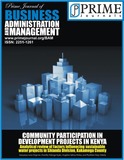Community participation in development projects in Kenya: analytical review of factors influencing sustainable water projects in Shianda division, Kakamega county

View/
Date
2014Author
Kanyanya, Loice O
Kyalo, Dorothy N
Mulwa, Angeline S
Matula, Phyilisters D
Language
enMetadata
Show full item recordAbstract
Project Sustainability is a desire of every community, private agency or Government as a means of ensuring that positive gains are delivered to the target communities in long term. This phenomenon is brought to focus in this study based on water projects
that aim at improving the quality of life of community water users. The implementation of such projects is always easier but their sustainability poses a challenge. The study objectives of the study was to establish the extent to which
Community participation; Community education and
training on technology used; Project location and Community capital contribution
influence sustainability of water projects Descriptive survey was used as the research design and the target population was 44,325 people. Stratified pro portionate random sampling techniques were used to select 196 respondents who included community leaders, project leaders
, water users/beneficiaries and key informants from the division The sample for the study comprised of 23 Community Water Projects, 46 Community Project Leaders, 8 Local leaders and 142
community water users. Data was collected through questionnaires and analyzed through descriptive statistics where frequency tables and percentages were used to represent the data. In addition, a multivariate regression model was applied to determine the relative importance of each of the three variables with respect to Sustainability CWPs. The findings of the study revealed that both men and women were involved in leadership with more men (88%) in local leadership and more women (65%) in project leadership. Almost all CWUs as well as the leaders were employed with the highest percentage in self employment thus able to contribute towards repair and maintenance of CWPs in
monetary terms. The study also revealed that, of the three factors under study, two of them (Community Education and Training on Technology used and Community Capital Contribution) influenced sustainability of CWPs in Shianda Division to a very great extent but project location though an important factor to consider for CWP s sustainability, its influence was moderate. The findings further revealed the need for project initiators: to involve CMs at all levels of the project cycle as this would build ownership of the project, train and educate CMs on how to operate and maintain the water facility so that its continuity is not affected by breakdown, allow CMs to contribute towards the choice of the site for the water point and advise them on the need for them to contribute money towards operation and maintenance of
CWPs as this encourages ownership and assures sustainability.
The study recommended that community members be trained and
educated on the technology used in CWPs and on how to operate and maintain the system. The study
also recommend ed that these trainings need to be frequent and an analysis on the education level of the CMs be made in order to establish the most suitable language mode of training to use so as to assure effective transfer of knowledge from the trainer to the trainee.
Project CMs should be involved in
identification of the site for the project in order to encourage ownership in terms of protection and cleanliness of the site
Community water
users should be encouraged to contribute towards the same in order to a
void rendering the project dysfunctional or unsustainable on
breakdown as they wait on well
wishers who may not be available
Citation
MULWA DRANGELINESABINA. Community Participation in Development Projects in Kenya: Analytical Review of Factors Influencing Sustainable Water Projects in Shianda Division, Kakamega County. University of Nairobi school of Business: University of Nairobi; 2014.Publisher
University of Nairobi
Collections
- School of Business [175]
